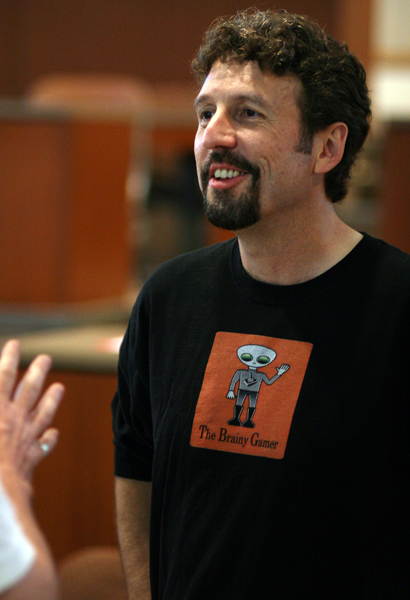 Professor of Theater Mike Abbott ’85 isn’t surprised by the latest Pew Internet/MacArthur Foundation study that shatters the "lone gamer" stereotype and sees potential for video games to develop civic engagement in teens and young adults.
Professor of Theater Mike Abbott ’85 isn’t surprised by the latest Pew Internet/MacArthur Foundation study that shatters the "lone gamer" stereotype and sees potential for video games to develop civic engagement in teens and young adults.
Abbott’s The Brainy Gamer Web site has been buzzing with proof of such engagement for more than a year (and a half-million hits).
The 2000 winner of the College’s top award for teaching, Abbott built the site—a blog and international discussion forum on narrative video games—in August 2007 as part of his sabbatical research. He was inspired by his experience teaching a Wabash freshman tutorial called The Art and History of Electronic Gaming.
"In that class, I encountered the most impassioned and thoughtful discussions, the best examples of creative and critical thinking, and the finest papers I’ve read in all my years teaching," Abbott says. During his sabbatical he interviewed educator Professor James Gee, author of What Video Games Have to Teach us About Learning and Literacy. Gee has written that "21st-century learning must be about understanding complex systems," and "that's what games at their best can do. The passive spectator gains insight by getting involved."
He also introduced Abbott to the phrase "passion communities," which Gee calls "an alternative learning system that teaches better than most schools."
The Brainy Gamer has become such a community, with more than 515,000 hits and 3,200 comments on the subjects Abbott has introduced there. He says the way members of that community respectfully and knowledgeably discuss even the most controversial issues could be a model not only for how Wabash students interact in virtual communities, but in face-to-face learning communities, as well.
So Abbott finds studies being done on the civic impact of gaming "especially interesting."
"Much work is being done in this area," Abbott says, "with results that contradict commonly-held assumptions."
Enter the Pew Internet/MacArthur Foundation report "Teens, Video Games, and Civics" released September 16, which shatters the stereotype of gamers as "socially isolated and distracted from the broader society."
On the MacArthur Foundation Web site Spotlight, Mills College Professor Joe Kahne reports that "teens who frequently play video games are just as likely as those who play infrequently to be civically and politically engaged—to volunteer, give money to charity, try and convince someone to vote, express interest in politics, commit to improving their communities, and to take part in protests and demonstrations.
"Moreover, when we asked teens whether they had ‘civic gaming experiences’ such as helping or guiding other players, thinking about moral and ethical issues, and learning about social issues, we found that teens who frequently had these experiences were much more likely to be civically and politically engaged—to raise money for charity, to be interested in politics, etc."
Discussions on The Brainy Gamer are already contributing to this rapidly growing area of study, but Abbott has more in store through his Brainy Gamer podcasts.
"I've assembled a team of more than 20 of the best games bloggers around, and I'll be inviting two or three each month to join me for a regular segment I'm calling the Gamers Confab," Abbott says. "We'll discuss a variety of issues related to video games and offer opinions and analysis that I hope will be unique and useful to our listeners."
"There’s a secret about blogs that most people don’t know," Abbott writes in a recent Brainy Gamer entry. "They produce scholarship.
"Not all of them, certainly, and not even most of them," Abbott admits. "But some video game blogs, absent a formal academic discipline, have built a community of experts that function in ways that embody the kind of discourse we normally call scholarly. That is, they work with a body of knowledge, principles, and practices to make claims about the subject they believe to be valid and verifiable, and they share these claims with their peers publicly, inviting comment and review.
"This process happens [at The Brainy Gamer] and elsewhere every day. I've linked to and interviewed many of these devoted writers. Many of those [engaged in these discussions] are "legitimate" scholars from traditional fields who happen to love games. Others are simply serious gamers who have steeped themselves in the history of the medium and feel personally invested in its future.
"And, like the very best scholars, they love what they do and have a blast doing it."
Read Professor Abbott’s blog at www.brainygamer.com